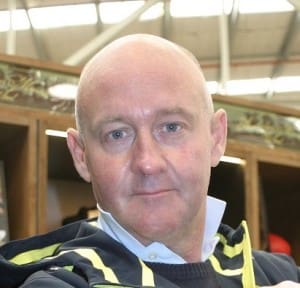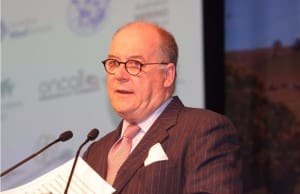AUSTRALIAN Wool Innovation and the International Wool Textile Organisation leaders have defended their lack of engagement with the development of an international sheep animal welfare system that prohibits mulesing.
AWI chief executive officer Stuart McCullough at the 85th IWTO Congress in Sydney last week said the Australian industry was doing a good job in its management of the perception of animal welfare in relation to sheep.
“Our wool growers in Australia are the most wonderful custodians of not only their animals but their land as well, in every way shape or form.
“What isn’t good is we at a conference where there seems to be a lot of talk about this from within the industry which escalates into the media
“We entrust our wool growers to do the very best they can to keep their animals alive and will not impose on them other things they don’t think are appropriate.”
“What right has a group like this who is based in North America, at the top of the world – have these people ever been here, have they been on a farm?”
Textile Exchange’s Director of Industry Integrity Anne Gillespie said her organisation reached out to Australian Wool Innovation initially in the spring of 2014, “to several people within both AWI and the International Wool Textile Organisation,” seeking their engagement in development of the standard, but Mr McCullough claimed no knowledge of this. Although the IWTO agreed to attend RWS meetings as an observer.
“I’ve never seen their Responsible Wool Standard.
“I don’t know, who did they send it to? In 2014 I had 117 employees so that doesn’t really narrow it down for me,” Mr McCullough said.
“We will not engage with these people who sit at the top of the world and want to impose disciplines on our wool growers that we think farm their properties and care for their animals to the world’s highest standards.
“We don’t think that just because they say they are the world’s highest standard that we should be listening to these people – and will not listen to them.”
When asked if he thought Australian wool had a credibility problem because many of the country’s sheep were mulesed, he replied: “The wool price is going up mate, they’re 60 cents dearer this week”, he said.
“So every kilogram that’s produced every year is sold, every kilogram every year and sold is made into garments and everyone of those garments is sold every year and wool prices continue to go up.
“So people can continue to talk about lack of demand, walk up to the auction room at the moment and see whether there is a lack of demand,” Mr McCullough said.
“So this chatter that there is a lack of demand is complete rubbish.”
Mr McCullough said Textile Exchange has put these issues on the radar of brands.
“I’m not sure where these people came from, I’m not sure what their agenda is.
“But they can sign up as many buyers as they wish, you need a seller, and tell me who the sellers are?” he said.
“We sell every kilogram every year.”
Mr McCullough said AWI supported IWTO’s Wool Sheep Welfare Guidelines – “we put it in place.”
IWTO has seen how Australian wool was grown, respected the sovereignty of state laws that govern cruelty to animals, he said.
“I’m not sure these other folks have even been here, have they?
“I entrust IWTO to have a clear understanding of what our wool growers do than some group from somewhere, I forget even where they are from.”
Mr McCullough said neither he nor AWI would be engaging with Textile Exchange on their RWS “as far as I’m concerned.”
IWTO to revamp its animal welfare guidelines
IWTO president Peter Ackroyd said he had not read all of Textile Exchange’s Responsible Wool Standard and would need to go through it with a farmer.
“It is so intrusive.”
Mr Ackroyd said he is not sure of retailers and brands that are listed on Textile Exchange’s Wool International Working Group committees for the Responsible Wool Standard, including adidas and Gucci.
“You should do some investigative journalism and ring Gucci’s press department and ask are they a supporter of Textile Exchange and find out what they say.”
He considered the genesis of Textile Exchange was “to put a positive spin on cotton”.
“Now if you want to put a positive spin on cotton then I think you come from a very disingenuous base – it is the most unsustainable fibre in the world.
“It causes hundreds of thousands of suicides India, uses massive amounts of water and doesn’t biodegrade,” he said.
“If someone was employed to put a spin on that then I am slightly suspicious of the organisation.”
Mr Ackroyd said he wasn’t concerned that brands and retailers would support the Responsible Wool Standard rather than IWTO’s own sheep welfare guidelines, due for launch in September this year after a revamp.
“I don’t think so, it’s going to be a very rarefied atmosphere to get into that sort of thing.
“In my initial understanding of it is that it (the RWS) is a very involved document.”
The IWTO’s animal welfare guidelines were issued in 2013 and will be launched at what is being called a Dumfries House declaration in Scotland in September.
“The guidelines are already good enough for the European Union, the United Nations Food and Agricultural Organisation, the OIE, the RSPCA, basically they are pretty good.”
Mr Ackroyd said some textile processors, particularly weavers have incorporated the IWTO guidelines into their corporate social responsibility documentation.
“But probably not enough, more needs to be done and that’s probably why we are going to make a special effort to do it.”
The draft RWS’ health module states measures should be taken to prevent or control fly strike, yet surgical mulesing is prohibited while farms with ceased mulesing status are accepted.
IWTO’s Wool Sheep Welfare Guidelines state that surgical procedures should be avoided wherever possible and should only be performed where there is a positive health or welfare benefit for the animal.
“Where surgical procedures cannot be avoided, the resulting pain should be minimised by selection of the most appropriate method for the age of the animal, and the use of anaesthesia and analgesia, where practicable.
“Genetic, technological, and management interventions should be sought and applied to remove the need for surgical procedures.”
At the IWTO Congress in Sydney recently, leading textile federation Sistema Moda Italia asked IWTO to release a worldwide standard for animal welfare and not mere guidelines. The federation also sought the inclusion of the use of anaesthetic pain relief before and after sheep were mulesed.
Mr Ackroyd said the animal welfare guidelines vs standards discussion was one of semantics.
“A guideline can become a standard; if you accept the guideline it becomes your standard.”
But he said the current IWTO guidelines recommendation for pain relief to be used for mulesing could not be made mandatory.
“I can’t do that, I don’t have the authority, I am not the European Union.”
Mr Ackroyd said Textile Exchange has taken “an” initiative in the sheep welfare area.
“If it’s a culpa nostra (our fault) then we haven’t been robust enough with our guidelines.”
He believed the way forward for wool was a stronger message about fly strike prevention, which is done to prevent sheep dying.
“They cut breech from sheep in the Welsh hills, they cut the breech from sheep everywhere, where there are flies, it has been done forever.”
Mr Ackroyd said IWTO told all its members that the RWS was coming into the public domain for a consultation in late February.
The deadline for submissions on the draft Responsible Wool Standard was today, after which Textile Exchange and the RWS International Working Group will make revisions to the standard and release it for a second review period of 30 days.



Stuart McCullough’s statements in this article are not what you should expect to read from the head of an organisation supposed to represent the best interests of all its levy payers. They demonstrate an organisation out of touch with the certification programs which wool levy payers may wish to participate in. If he took the time to read the Textile Exchange’s Responsible Wool Standard he would know that it is a voluntary program that wool growers and other players in the value chain may agree to participate in.
Australian Merino wool farmers voluntarily participate in a range of certification programs including organic certification, NewMerino® , SustainaWOOL™ Integrity Scheme, and EthEco® which have specific requirements for sheep welfare and environmental management. Most of these programs insist on no mulesing or if done it must be with pain relief.
These programs have not been roundly criticised by the AWI, so what’s different with the Responsible Wool Standard?
This article doesn’t give any evidence as to why it should be criticised given the CEO has “…never seen their Responsible Wool Standard”. To say AWI “…will not engage with these people (Textile Exchange)…and we will not listen to them” is arrogant in the extreme as it is highly likely some Australian Merino sheep farmers will participate in it.
To suggest the Textile Exchange wants to “…to impose disciplines on our wool growers…” is inaccurate as it is a program, just like all the others, which farmers and processors voluntarily participate in.
McCullough’s attitude suggests AWI is only interested in engaging with Merino sheep farmers and value chain participants who hold the same views about mulesing practices as it does. He scorns the Textile Exchange’s approach to sheep welfare on the basis that the organisation “…is based in North America, at the top of the world..”. Where is most of Australia’s high value Merino textile clothing sold?
In making these comments about the Responsible Wool Standard McCullough is ostracising levy paying Merino sheep farmers who aspire to different ideals by personal choice and/or by participating in programs with specific animal welfare standards involving not mulesing their sheep. He also highlights to the Merino wool value chain and consumers, that AWI prefers to support the sheep welfare views of Australian Merino wool farmers who practice traditional husbandry techniques and do not intend to embrace sheep genetic selection and management strategies to avoid the need for mulesing to prevent breech fly strike. That’s a curious position for AWI because over the last decade it has spent millions of dollars of levy payers funds on research programs to uncover alternatives to mulesing.
Congratulations to Australian Wool Innovation and the International Wool Textile Organisation for getting stuck into this ratbag group, Textile Exchange. They do not deserve breathing space. woolman.biz